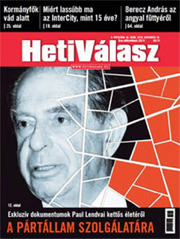 The revelations set the Hungarian media on fire. On 18 November the weeklyHeti Válasz published an investigation, corroborated by five documents in the foreign ministry archives, showing that Paul Lendvai collaborated with the Communist regime.
The revelations set the Hungarian media on fire. On 18 November the weeklyHeti Válasz published an investigation, corroborated by five documents in the foreign ministry archives, showing that Paul Lendvai collaborated with the Communist regime.
An émigré in Vienna ever since the Hungarian uprising was crushed in 1956, Paul Lendvai is Hungary’s most famous political commentator. He recently put out a book entitled Mein verspieltes Land (My Squandered Country) painting a grim picture of present-day Hungary beset by resurgent racism and anti-Semitism.
Viktor Orbán, an out-and-out autocrat?
Unnerved byHeti Válasz’s revelations, Paul Lendvai wouldn’t answer questions from the press but explained that he himself had been followed by the political police. “It should come as no surprise that, unless they’re forced to, nobody just comes out and admits, ‘I was a real son of a bitch, forgive me’. Those who do are the exception, not the rule: that’s human nature,” regrets László Tamás on the sitehirszerzo. But the left-leaning editorialist adds that “János Martonyi and Pál Schmitt” – one-time protégés of the Communist regime, now turned right-wing, currently foreign minister and president, respectively – “wanted to live. And live well. Paul Lendvai did too – seeing as he was the leading expert on Hungarian politics in the West. And they paid the price exacted by the dictatorship. That was that. But now they have to pay the moral price democracy exacts of them for their former opportunism.”
We’ve got to stop digging up the past
Six months after Fidesz (centre right) won the general elections by a comfortable margin, and as Hungary braces to take over the EU presidency, this affair adds new fuel to the ongoing controversy over the politics of prime minister Viktor Orbán, whom many consider an out-and-out autocrat.
On his blog, socialist ex-prime minister Ferenc Gyurcsány is one of the few to come to Paul Lendvai’s defence. “I am disgusted. This affair is only half about Lendvai. Actually, it’s about the Hungarian right wing.[…] As for me, I support him in his struggle to make a case for his decisions of yesteryear.[…] And we’ve got to stop digging up the past.”
In the independent weekly HVG, János Pelle notes that “many are expecting that Orbán, rather than laying the foundations for a sturdier democracy, will impose an authoritarian system and, just like Putin, entrench himself permanently in power. The only way for him to refute these accusations will be through concrete deeds and gestures.” And yet, wonders this journalist and history professor at the rabbinical school of Budapest, “How come Western journalists are always so forbearing when it comes to left-wing governments, but harping on the Fascist peril every time Orbán gets mentioned?”
Context
Doyen in the dock
“Paul Lendvai finds it ridiculous that he’s being accused of ‘having been an agent’ [of the Hungarian communist regime] and he’s absolutely right. The Viennese journalist, an executive member of the Austrian Social-Democratic party, was definitely not an agent, but voluntarily collaborated with the dictatorship. And as such he did harm to the Hungarian democratic opposition and has marred the memory of the uprising in ’56,” comments Lukács Ádám Petri (whose father György was an important dissident figure) in Népszabadság.
“When Paul Lendvai passes on confidential information about the alternative cultural forum to be held in Hungary, he knows his conduct is shameful, which is why he asks for discretion at the embassy,” adds Lukács Ádám Petri. “And he reports quite contentedly to the representatives of the dictatorship that, on Austrian TV broadcasts whose programming was under his direction, he prevented representatives of the Czech democratic opposition from speaking.” In a word, denounces the author, “Lendvai used his prestige and his knowledge to disguise the repulsive reality of the dictatorship.”
Was this article useful? If so we are delighted!
It is freely available because we believe that the right to free and independent information is essential for democracy. But this right is not guaranteed forever, and independence comes at a cost. We need your support in order to continue publishing independent, multilingual news for all Europeans.
Discover our subscription offers and their exclusive benefits and become a member of our community now!












